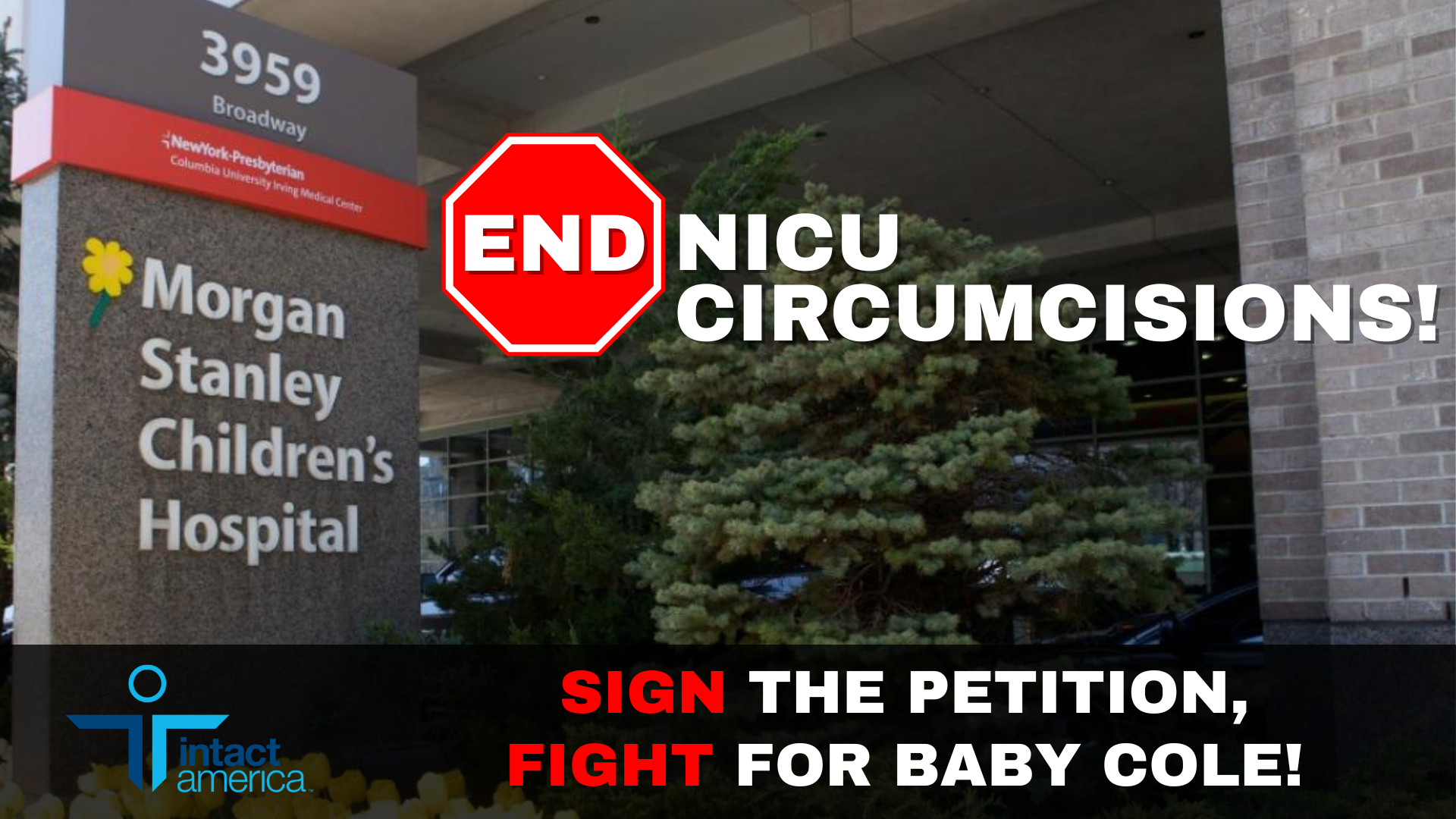INTACT AMERICA LAUDS DOCTORS, MEDICAL ETHICISTS FROM 17 COUNTRIES
FOR TELLING AMERICAN ACADEMY OF PEDIATRICS TO STOP
CHAMPIONING NEONATAL MALE CIRCUMCISION
AAP REPORT RECEIVES FORMIDABLE TRANSATLANTIC CRITICISM
IN JOURNAL OF MEDICAL ETHICS AND ITS OWN PEDIATRICS JOURNAL
Tarrytown, NY—March 19, 2013
The American Academy of Pediatrics should be reeling today from two independent blasts of criticism from doctors and medical ethicists saying the AAP’s Task Force report last summer, which softened its opposition to routine neonatal male circumcision, is unsupported by scientific data or medical ethics.
Articles in the AAP’s own journal Pediatrics, and in a special issue of the British Journal of Medical Ethics, took the AAP to task for its report issued in August 2012 that stopped short of recommending in favor of circumcision, but called for public and private medical insurance to cover the costs for an unnecessary and inherently risky surgery performed more than a million times a year in the United States.
“It has become clear that the AAP, not those of us in the intactivist movement who have argued for years against the surgery, is an outlier in the discussion about the efficacy and necessity for male circumcision,” said Georganne Chapin, founder and executive director of Intact America (www.intactamerica.org), the leading voice for changing the way America thinks about circumcision.
“The AAP is more interested in its doctors getting paid for performing circumcisions than in protecting the bodily integrity and health of children. The same right to bodily integrity that led to the outlawing of female genital mutilation should extend to baby boys as well.”
The first barrage of criticism came from an article in the AAP’s journal Pediatrics, in which pediatricians and professional associations from 17 countries criticize the AAP Task Force report as riddled with bias and out of step with the increasing awareness among doctors and parents that routine infant circumcision is unnecessary and inherently risky. Circumcision rates in the United States continue to plummet, and have never exceeded 10 percent in most European countries.
“There is growing consensus … that physicians should discourage parents from circumcising their healthy infant boys because non-therapeutic circumcision of underage boys in Western societies has no compelling health benefits, causes postoperative pain, can have serious long-term consequences, constitutes a violation of the United Nations’ Declaration of the Rights of the Child, and conflicts with the Hippocratic oath: primum non nocere: First, do no harm,” wrote the 40 pediatricians, urologists, epidemiologists and other doctors who signed the article.
“Circumcision fails to meet the commonly accepted criteria for the justification of preventive medical procedures in children,” the doctors wrote.
A second flank of criticism came from the prominent British Journal of Medical Ethics, which dedicated a special issue to the ethics of infant and child circumcision.
An article in the ethics journal by Dr. Robert Van Howe, a Michigan medical school professor and pediatrician, and J. Steven Svoboda, head of the Berkeley-based Attorneys for the Rights of the Child, states: “Rather than objectively evaluating all available evidence, the AAP selectively quotes and references highly-contested and controversial studies to attempt to justify an entrenched, yet outmoded, cultural—not medical— practice.”
These authors cite comments by Oxford University ethicist Brian D. Earp, who described last summer’s AAP report as “replete with non-sequiturs, self-contradiction and blatant cherry-picking of essential evidence” in an attempt to justify a call for government-backed medical insurance to cover the surgery.
The multi-authored international article published in the journal Pediatrics systematically considered and rejected the variety of medical reasons the AAP task force attempted to use to justify its position.
- The AAP report claimed circumcision could cut down on cases of penile cancer, one of the rarest forms of cancer, but the international physicians’ response noted that penile cancer linked to the human papillomaviruses is treatable if diagnosed early, and can be prevented through condom use or prophylactic vaccination. There is “no compelling reason” to remove healthy functioning tissue from the penis of a baby boy to prevent such a rare and treatable disease.
- The AAP report claimed circumcision can cut down on cases of urinary tract infection. The international physicians note that UTIs can be treated with means far less drastic and risky than the removal of healthy tissue.
- The AAP report claimed circumcision can cut down on cases of sexually-transmitted diseases, including HIV/AIDS. The international physicians point out that the AAP is relying on findings from disputed African studies of sexually active, adult heterosexual men—“findings … not in line with the fact that the United States combines a high prevalence of STDs and HIV infections with a high percentage of routine circumcisions.” Further, “The situation in most European countries is precisely the reverse: low circumcision rates combined with low HIV and STD rates. Therefore, other factors seem to play a more important role … than circumcision status.”
The international physicians argue repeatedly that boys should be allowed to decide for themselves, when they are of an age to do so, whether to permanently alter their bodies to seek a level of protection against diseases for which there are less drastic, more effective preventive strategies.
In a response to the critique by the international physicians, published in the same issue of Pediatrics, the authors of the AAP Task Force report—which included members already on record as favoring the surgery—repeated their contention that infant circumcision is justifiable from a scientific standpoint and labeled the physicians’ response as biased against circumcision. They go on to restate their position that parental consent is satisfactory for this medically unnecessary intervention.
“It is rather astonishing,” Intact America’s Chapin said, “that a predisposition to the natural male body—a product of millions of years of evolution—should be seen as a ‘bias’; it is equally astonishing that the AAP continues to insist that parents have chattel rights over their male offspring, when the entire framework of international human rights law deems otherwise.”
Intact America is based in Tarrytown, N.Y. Visit Intact America at www.intactamerica.org, on Facebook, and on Twitter.





